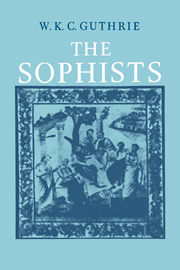Book contents
- Frontmatter
- Contents
- List of Abbreviations
- Preface
- I INTRODUCTION
- II TOPICS OF THE DAY
- III WHAT IS A SOPHIST?
- IV THE ‘NOMOS’ – ‘PHYSIS’ ANTITHESIS IN MORALS AND POLITICS
- V THE SOCIAL COMPACT
- VI EQUALITY
- VII THE RELATIVITY OF VALUES AND ITS EFFECTS ON ETHICAL THEORY
- VIII RHETORIC AND PHILOSOPHY (Seeming and being, believing and knowing, persuading and proving)
- IX RATIONALIST THEORIES OF RELIGION: AGNOSTICISM AND ATHEISM
- X CAN VIRTUE BE TAUGHT?
- XI THE MEN
- Bibliography
- Index of passages quoted or referred to
- General Index
- Index of selected Greek words
III - WHAT IS A SOPHIST?
Published online by Cambridge University Press: 05 August 2015
- Frontmatter
- Contents
- List of Abbreviations
- Preface
- I INTRODUCTION
- II TOPICS OF THE DAY
- III WHAT IS A SOPHIST?
- IV THE ‘NOMOS’ – ‘PHYSIS’ ANTITHESIS IN MORALS AND POLITICS
- V THE SOCIAL COMPACT
- VI EQUALITY
- VII THE RELATIVITY OF VALUES AND ITS EFFECTS ON ETHICAL THEORY
- VIII RHETORIC AND PHILOSOPHY (Seeming and being, believing and knowing, persuading and proving)
- IX RATIONALIST THEORIES OF RELIGION: AGNOSTICISM AND ATHEISM
- X CAN VIRTUE BE TAUGHT?
- XI THE MEN
- Bibliography
- Index of passages quoted or referred to
- General Index
- Index of selected Greek words
Summary
The Greek words sophos, sophia, usually translated ‘wise’ and ‘wisdom’, were in common use from the earliest times, and, standing as they do for an intellectual or spiritual quality, naturally acquired some delicate shades of meaning which can only be crudely illustrated here. At first they connoted primarily skill in a particular craft. A shipwright in Homer is ‘skilled in all sophia’, a charioteer, a steersman, an augur, a sculptor are sophoi each in his occupation, Apollo is sophos with the lyre, Thersites a contemptible character but sophos with his tongue; there is a law in Hades (for comic purposes) that whoever excels his fellow-craftsmen in ‘one of the great and clever arts’ shall have special privileges until someone else comes along who is ‘more sophos in his art’. This sense merges easily into that of generally knowing or prudent, by way of a line like that of Theognis (II9ff.) that it is easy for a sophos to detect counterfeit coinage, but much more difficult to unmask a man of spurious character. Here sophos might still mean an expert (there are experts in testing coinage, but alas none in testing humanity), though more probably it is going over to the meaning of knowledgeable in general. In a similar doubtful position is Hesiod's description of Linus, the mythical singer and musician, as ‘versed in all kinds of sophia (fr. 153 Rzach). In this way it was used of the seven Sophoi Wise Men or Sages, whose wisdom consisted chiefly of practical statesmanship and was enshrined in brief gnomic sayings, or of anyone of good sense (Eur. I. A. 749).
Along with generalization, a term of value like this, implying positive approval, inevitably suffers division into a ‘true’ and a ‘false’ meaning according to the user's point of view. The sophia of charioteer, shipwright or musician must have been to a large extent acquired by learning, but Pindar no doubt pleased his royal patron when he wrote that he who knows much by nature is wise (sophos), in contrast to the chattering crows who have gained their knowledge by learning.
- Type
- Chapter
- Information
- A History of Greek Philosophy , pp. 27 - 54Publisher: Cambridge University PressPrint publication year: 1977



